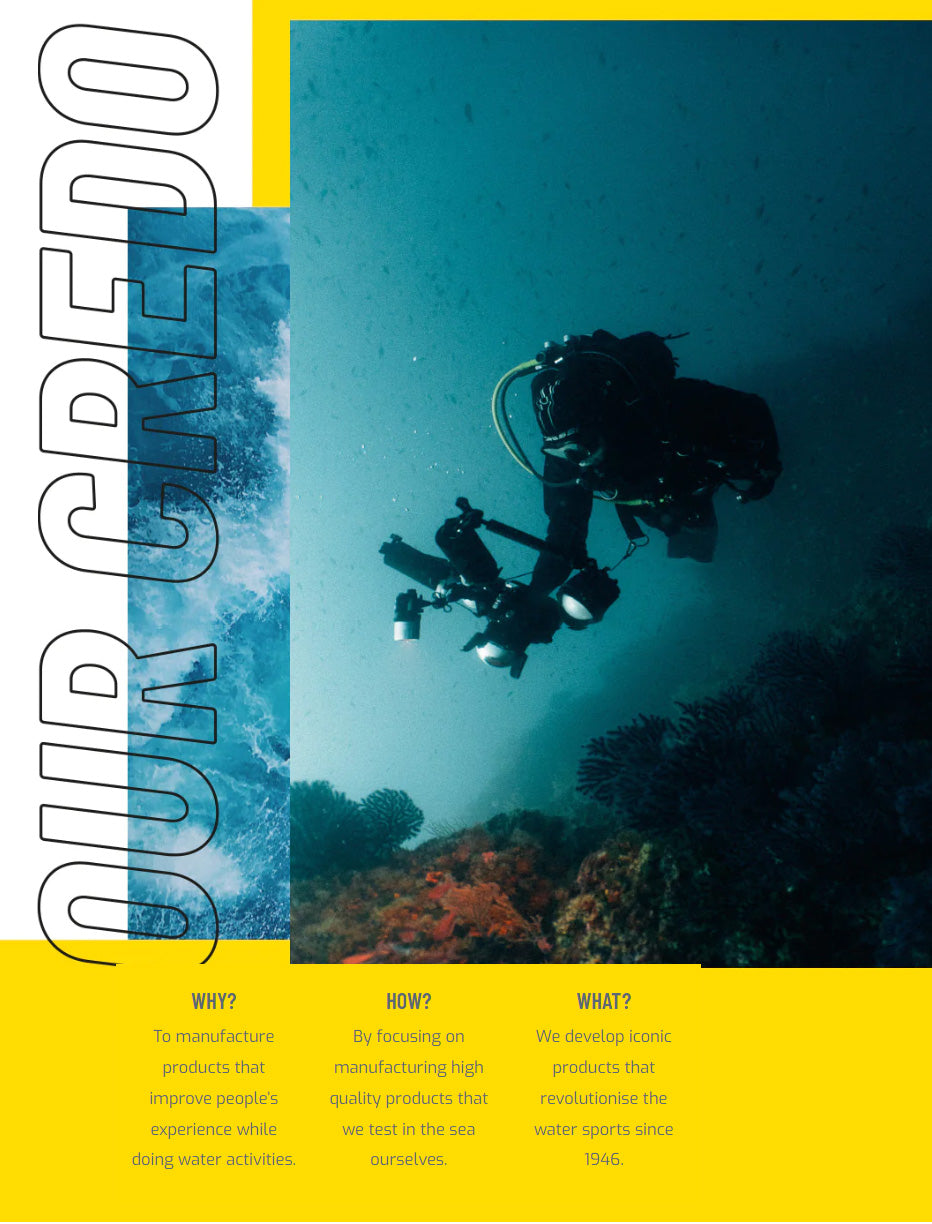
Our Credo
We were born as a family business, in Italy, a long time ago. Staying true to our core values during seventy-plus years has helped us create a company we’re proud to run and work for.
We now have offices around the world, and our team has grown, day by day, into a large Cressi family. We want to provide an inclusive, fair and ethical work environment, where every individual is considered as a team-player, and given equal opportunity for employment, development, and career progression.
We feel the greatest responsibility towards every water-sport lover. The wide community of scuba-divers, snorkelers, free-divers, swimmers, and everyone who enters the sea using one of our products.
Our people. We want to help them to enjoy the water world in the safest and most pleasant way possible.
When we design a new product we have a few clear concepts in our mind: it must be functional, easy to use, repairable and most of all that it shall last in time.
This is why we are proud when we see a vintage regulator still being used today (and it happens all the time). Because products are meant to live long.
Proof that the project was sound, and the manufacturing strong. Long lasting products also help control our ecological impact on the environment.
It may not seem much. A small drop into the ocean. But it is also through engaging in responsible environmental activities and consumption that we will bring change, for the benefit of future generations and the underwater worlds of our planet.
Innovation
Cressi’s legacy of innovation began in 1939 with two brothers who shared a passion for the sea and a gift for technical design and working with their hands. By 1946 their designs and products had become so popular they founded the Cressi company in Genoa, Italy. Today, although Cressi is a worldwide leader in water sports manufacturing, it is still wholly owned by the Cressi family.
Commitment
Whether they know it or not, customers are the real architects of the Cressi brand. All that the company does, from designing and to selling and servicing them, is driven by a commitment to meet the needs and expectations of the customer. This principle governs all of Cressi’s business relationships, from seeking the highest quality materials to demanding the highest standards of its retail partners.
Passion
The Cressi brothers combined their passion for the sea with a passion for products and for the customers they served. It remains the core element of the company’s culture today. It is a passion fueled by Antonio Cressi using the same commitment to the sport shown by his father and uncle. Put simply, passion is at Cressi’s core because Cressi remains at the core of the sport.
Evolution
Cressi’s long history of product innovations comes from a drive to continually improve. As the sport has evolved, so has Cressi, often serving as the catalyst for change. From designing new products to developing new manufacturing processes, Cressi draws on a wealth of technical expertise and creative knowledge from the past. At Cressi, every innovation is a step toward the future.
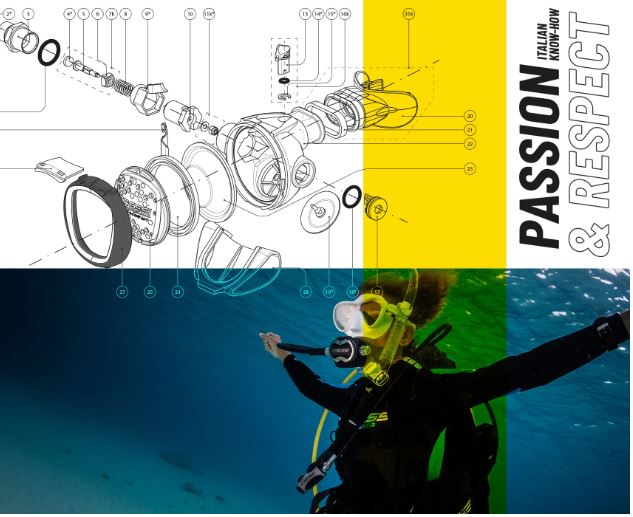
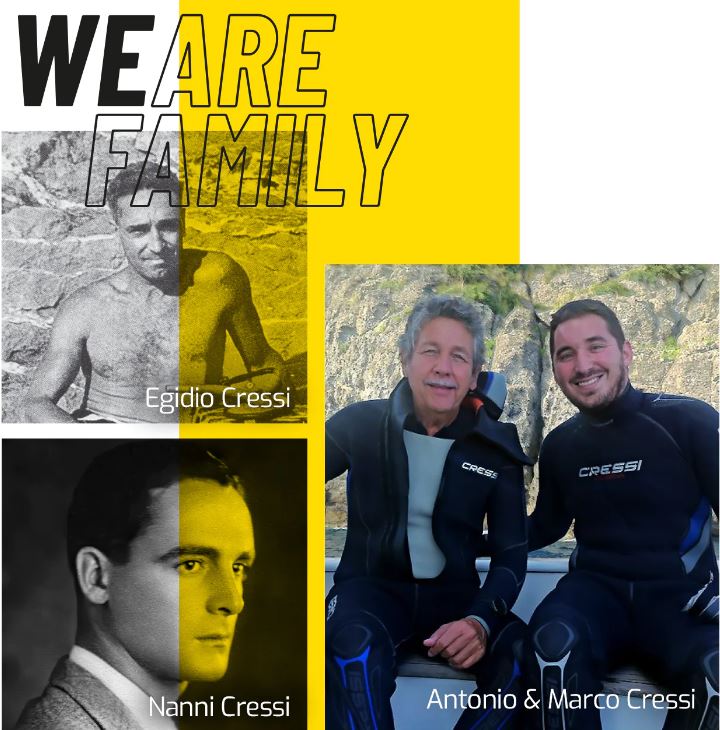
The brothers Egidio and Nanni
Egidio Cressi, born in 1902, was a Genoese banker who, in the 1930s, gave up his career to cultivate his passion and build a business around it. He went fishing with a group of friends. What he really likes is to dive from the rocks between Genoa and the Gulf of Tigullio and hunt for prey among the rocks that descend steeply to a depth of 100 metres. The small association began to make its own masks and spear guns. They set to work in a small workshop that Egidio had set up at home, in Via Monte Zovetto, in Albaro. It was still a kind of hobby after work, but just before the world war, the commitment - and the success with other enthusiasts - required more space: the first workshop was set up in a building in Corso Torino.
These first records date back to 1938, but to find any official record of the origins of Cressi, we have to wait until 1944, when it was registered as a craft enterprise under the name of Egidio Cressi. The name under which it began to be known after the war was different: it appeared in 1946 and was “Il Pescatore Subacqueo Cressi”. Seven years later, the company had come a long way: it moved on to a semi-industrial dimension with a small factory in Via Majorana in Quinto and, at this point, his brother Giovanni Battista, born in 1909, better known as “Nanni”, joined the company, changing the name to “Il Pescatore Subacqueo Cressi di Egidio e Nanni”. At the time, not much was known about the problems associated with breathing underwater. And here Cressi achieved one of its first successes by perfecting the Aro, a closed-circuit oxygen rebreather that absorbs the diver’s carbon dioxide through soda lime and therefore does not emit bubbles towards the surface.
The early 1950s are fundamental for snorkelling in general and for Cressi in particular. In the beginning Fins are made from reused tyre tyres, cut to size. Soon, they start with para-industrial casts. In 1951, Cressi patented a true revolution: the Rondine fin, with the shoe joined to the blade in overlap rather, was a fundamental innovation that drastically reduced the physical fatigue of the swimmer. Another stroke of ingenuity, two years later, is the Pinocchio mask, which allows the nostrils to be tightened for the fundamental “compensation” in every dive.
In the 1970s the passion for the sea and holidays on the beach infected everyone. It was also the time when Antonio, born in 1953, Nanni Cressi’s son, joined the company. The young man became director of the company.
Our land, our sea
It was to fish in the depths of Portofino and San Fruttuoso that, just before the Second World War, a group of friends thought of new equipment. Situated between the French border and Tuscany, Liguria is one of the smallest regions in Italy. The Italian riviera is reflected in the blue Mediterranean Sea, but is also surrounded by mountains that drop sheer into the sea. Vegetation forms the backdrop to some of the country’s most popular and well-known seaside resorts.
The coasts are generally high, rocky, jagged, especially in the Riviera di Levante, while in the Ponente there is an almost perfect alternation between sheer cliffs and sandy beaches.
It couldn’t be any other way, the strong passion for the sea finds its place in a unique setting with depths to explore.
“Portofino’s promontory is one of the most beautiful places I’ve ever seen. It is also ideal for safe scuba diving, because its steep cliffs fall deep into the sea, directly to 40 meters of depth. This fact allows you to be close to the shore throughout your dive, making it safer and more enjoyable. This is one of the reasons why scuba diving was born in this area.”
Antonio Cressi
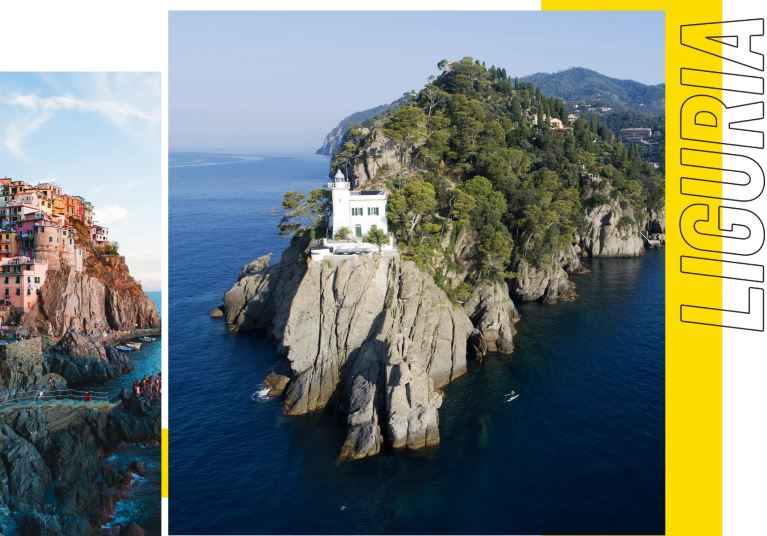
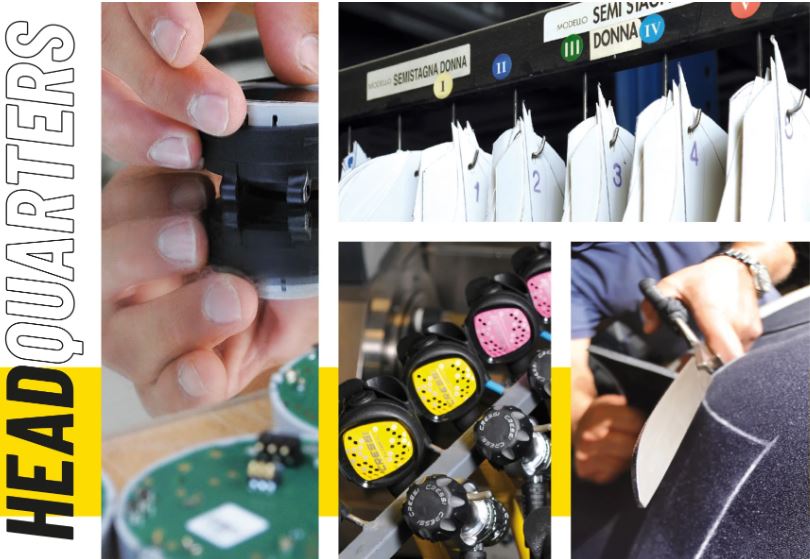
Cressi Headquartes
In 1989, the company was enlarged, moving it to Via Adamoli, along the Bisagno valley in Genoa. And then came the electronics department. Since 2008 we have created a research and development department for this sector and so we produce directly the many control instruments that are now used during diving. With 150 employees and four foreign subsidiaries, Cressi is now the second brand on the Italian market and the fourth on the world market, with exports accounting for 80% of turnover.
"I’m proud to have brought back production that had been moved ABROAD."
Antonio Cressi
The brand and the manufacturing process remain firmly anchored in the place the company was founded. In an age when production is often out-sourced, Cressi’s offices and production facilities remain in Genoa, Italy. This strategic location has played a vital role in the company’s historical success and continues to provide it with an important advantage in the market today.